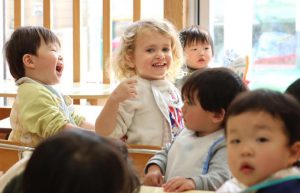Evacuee families in Hiroshima two years after Russia’s invasion of Ukraine, Part 2 — Daughter unaware of war in her home country
Feb. 22, 2024
Mothers and children continue to live by themselves
by Teru Matsumoto and Kyoko Niiyama, Staff Writers
“I want to go to Ukraine!” said two-year-old Sofiya, with eyes alight, at her home in Fukushima City. The oldest daughter of Viktoria Katrych, 25, packs her favorite toys in her bag as she prepares to “go out.” While pleased to see her daughter’s growth, Ms. Katrych is filled with mixed feelings. For her daughter, she said Ukraine is merely “the home of her grandparents, with whom she speaks by video conferencing.”
Lived in Japan longer than her own country
The mother and her child arrived in Japan at the end of March 2022, only one month after the start of Russia’s invasion of Ukraine. Sofiya, seven months old at the time, has lived in Japan longer than in her home country.
Ms. Katrych reads illustrated children’s books in Japanese to Sofiya every night before her daughter goes to bed. Sofiya started attending a nursery school in the city last June. “I sometimes learn Japanese and Japanese anime from her,” said Ms. Katrych as she smiled.
Their peaceful life in Mykolaiv, located in southern Ukraine, was suddenly taken from them. The neighboring town was shelled, frightening the mother with the sounds of exploding bombs every day, day and night. She started placing her daughter under the bed to protect her in case something happened during the night.
Ms. Katrych cannot decide how best to explain the present situation in their country to her child, who has no memory of the war. “Someday I’ll have to tell her how much sorrow our country endures.”
Evacuees from Ukraine are comprised mostly of women and children, as the government issued a general mobilization order after the invasion by the Russian army that prohibited men between the ages of 18 and 60 from leaving the country for possible conscription into the armed forces. Many families went to live overseas, leaving the father or husband behind.
Unfamiliar school uniform
Hanna Teslenko, 37, lives in Hiroshima’s Nishi Ward with her 11-year-old daughter, Diana, a fifth-grader at one of the city’s elementary schools, and eight-year-old son, Yarik, a second-grader. While both children appear to be enjoying school life here, “I think it was hard for them at first,” recalled Ms. Teslenko.
The family was evacuated to Hiroshima from Kryvyi Rih, a city located in southern Ukraine, in April 2022. The children began attending school in the summer of that year, but they were reluctant to wear the unfamiliar uniforms and did not understand the language. Since they are also enrolled in school back home in Ukraine, they had to do the homework from their Ukrainian school in the evenings. They struggled with the combined workload from the two countries and would complain about how they wanted to return to Ukraine.
In consultation with the teachers, Ms. Teslenko had the Japanese school begin individual lessons for the children, and their school in Ukraine reduced the volume of homework after seeing photographs of the homework and report cards from the Japanese school. Her children began to smile again at some point this year, commenting that “Japanese kanji characters are fun” and “I’ve made lots of friends,” a change that makes the mother more than happy.
Although uncertainty about the future will not go away, the family will need to support each other and make the best of the situation. “The happiness of my children is paramount,” said Ms. Teslenko.
(Originally published on February 22, 2024)








